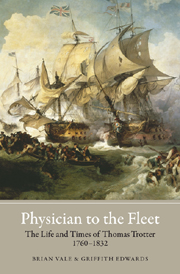Book contents
- Frontmatter
- Contents
- List of Illustrations
- List of Abbreviations
- Foreword
- Preface
- Background
- From Surgeon's Mate to Physician to the Fleet
- The Newcastle Years
- 12 Married Life and Civilian Practice
- 13 An Essay on Drunkenness
- 14 A War of Pamphlets
- 15 A View of the Nervous Temperament
- 16 Physician as Poet and Playwright
- 17 Thomas Trotter and the Great Theatre of Life
- Bibliography
- Index
17 - Thomas Trotter and the Great Theatre of Life
from The Newcastle Years
Published online by Cambridge University Press: 12 September 2012
- Frontmatter
- Contents
- List of Illustrations
- List of Abbreviations
- Foreword
- Preface
- Background
- From Surgeon's Mate to Physician to the Fleet
- The Newcastle Years
- 12 Married Life and Civilian Practice
- 13 An Essay on Drunkenness
- 14 A War of Pamphlets
- 15 A View of the Nervous Temperament
- 16 Physician as Poet and Playwright
- 17 Thomas Trotter and the Great Theatre of Life
- Bibliography
- Index
Summary
All the world's a stage
And all the men and women merely players;
They have their exits and their entrances:
And one man in his time plays many parts.
Shakespeare, As You Like ItFinal years
TROTTER WAS BUSY while he lived in Newcastle. The production of a succession of medical works, their preparation for republication in numerous editions and the demands of private practice took up all his time. He was a member of the Literary and Philosophical Society and opened his door regularly to offer free treatment to the poor, but he did not occupy any official position in the locality. He did, however, write occasionally on medical matters to the newspapers, as in 1816 when Newcastle was smitten with smallpox. In July and September, the Courant published open letters from him to the mayor, urging the introduction of compulsory vaccination against the disease.
One reason that Trotter did not try to find an official position in Newcastle was that he was still keenly interested in the welfare of the navy, with which he still felt a strong affinity. As is reflected in his works, his admiration for its officers and men knew no bounds, and it was in the navy that he had exercised his greatest influence and achieved distinction. He frequently harked back to those happy times and, in his writings and letters to the press, invariably described himself as a former physician to the fleet and quoted extensively from his naval experience.
- Type
- Chapter
- Information
- Physician to the FleetThe Life and Times of Thomas Trotter, 1760–1832, pp. 209 - 218Publisher: Boydell & BrewerPrint publication year: 2011

